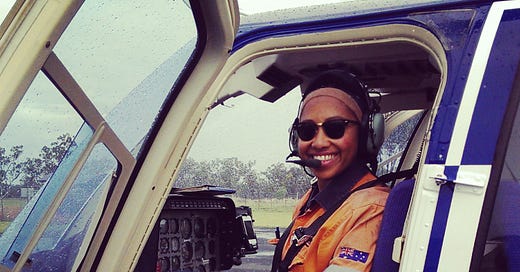There’s a lot about this Substack experience that reminds me of the ‘good old days’ of blogging. Do y’all remember those blogging days? I would check my RSS feed every morning for updates, running a WordPress site with the very earnest name ‘Redefining the Narrative’. You can find the archived posts here, many of which I wrote while working on the rigs almost a decade ago now. Pontificating on the fly in/fly out life, on working in 42+ degree C heat, on colleagues’ different approaches to safety. While scanning through these old posts, I even found this decade old video I made taking my viewers on a tour of my room at the camp!
Oh, the earnestness! The comfort! I blogged like the internet was my private journal. But things have changed since the 2000s and 2010s, and while it feels nice to be back on a longform, casual platform, there are some major difference between the Era of Blogging and the Era of Substack. I can’t help but feel that the past decade of ‘social media’ and what is termed as ‘platform capitalism’ has almost irrevocably changed the way we engage online.
What is Platform Capitalism?
A concept popularised by author Nick Srnicek, ‘Platform Capitalism’ is a new business model ‘predicated upon a voracious appetite for data that can only be sated by disregard for privacy (and often workers’ rights) and constant outward expansion.’ It is related to concepts like surveillance capitalism and digital capitalism, all big words to describe the familiar phenomenon rapidly overwhelming our lives.
In short: we live in an society where ‘capital’ reigns supreme. Decisions are made, at almost every political, social and economic level that place maximising capital - profit, wealth - at the forefront. In the past, economic capital was based on physical resources: human labour, fossil fuels, manufacturing, etc. Today, there is a new kind of ‘resource’ on the block: data. But data isn’t a physical resource. It is information about something else. An ‘abstraction1’, as some like to say. The thing about data though, is you can create it about anything. And in this economy we’re in, that’s what digital platforms like to do: datafication. Creating data about every aspect of our movements, thoughts, lives, in order to turn it into economic capital. And we don’t have a say in it.
What does this sidebar have to do with the blogging era, Yassmin?
Great question. Substack, as we know, is a platform. Yes, it makes money from the subscriptions, but it is also obsessed with data in a way that is typical in today’s era, but wasn’t a feature of the blogging days of yore. When I set up Redefining the Narrative over a decade ago, the focus wasn’t on how many people viewed or read my work. I couldn’t easily ‘compare’ how well my blog was doing (well = numbers going up) against my peers, because there were no dashboards set up collecting this information, ranking it, publicising it. That wasn’t the point. The point was to write, to share, to build community. While all that is now available on Substack, the platform is bursting with incentives to grow, to monetize, to compare. These incentives change the dynamic in these spaces, and resisting the capitalistic urge becomes a regular, never-ending exhaustion.
It is a similar dynamic across ‘social’ media platforms, embedding competition and expansion into spaces which should not (in my view) be prioritising these metrics. Even if you don’t begin on these platforms wanting to grow, the very design of the user interface, including the live feeds, the badges, the 'number of subscribers’ featured on a front page, means that you will end up thinking about whether or not you should be focused on expansion, wanting more. The platform might not punish you for not wanting to grow, but it certainly will make you feel bad for it. Every time I write a newsletter, if I don’t put a ‘subscribe’ button somewhere in the body of the text, a pop up appears on my screen, urging me to include one.
I technically have a choice, but it certainly doesn’t feel unemcumbered.
I don’t like going down the comparison route. I don’t think it brings out the best in me, I think it kindles feelings of envy and judgement that are less about how I actually feel and more about the challenge of navigating fundamentally rigged spaces.
Ultimately, I don’t want to run a newsletter that brings in six figures and pays my bills. For a while, I thought I did, but actually, I don’t. The realisation is liberating. I like writing these posts for free, sharing my thoughts with a small community of people who care, rather than providing a ‘service’ that feels transactional and profit-focused. I appreciate it when folks do support financially, but it’s a treat rather than an expectation. It’s perhaps an unpopular position - certainly, I don’t like to be exploited, and I am not advocating for the exploitation of cultural workers by large corporations. I am, in some way, trying to remained aligned with my values, rather than the values of the current economic system.
What to do about the urge to compare, then? I don’t know if I will ever be rid of it. But in times like these - especially in Ramadan - perhaps I can combat the ugliness by grounding myself, and remembering that everything that I have is by the grace of Allah. It can be taken away in the blink of an eye, or magnified ten-fold overnight. All I can control is what I do, the energy I put into my work and the demeanour in which I do it. When one pauses to reflect with genuine gratitude for the gifts of this life, gosh. Comparison ceases to make sense.
Watch: Netflix’s 3 Body Problem
You know I love a sci-fi show, and Netflix’s adaptation of a famous Chinese sci-fi novel is a decent showing. There is also apparently a Chinese adaptation on Peacock, but I’ve not been able to see it yet. Anyone checked this one out? What are your thoughts? Drop them in the comments!
Read: Ramadan and the Moon
My first piece for National Geographic was on Ramadan’s relationship with the moon, something which apparently, not everyone knows about!
Listen: The State of Netanyahu
I think it’s true to say that the problem with the policies of the Israeli state is not just about the problem of Netanyahu, but the current Prime Minister of Israel does have a lot to answer for in shaping the state’s image and direction. I found this short series on his rise to power fascinating and instructive.
Thank you, as always, for reading and commenting and sharing. I appreciated all your feedback on the fiction piece from last week as well, was so fun to hear how much it resonated with you all. In case you missed it…
AT SEA: Part One
This week’s newsletter is a departure from the usual, folks. I’m going to share with you all an excerpt from the first chapter of the first adult novel I’ve written and completed, AT SEA. Now, publishing is a funny beast. I’ve not yet sold this book, and currently have no sense as to whether or not it will find a home, or ever be released - traditionall…
May the last few days of Ramadan pass with ease, and I wish all celebrating a joyful Eid Mubarak.
Until next week,
Yassmin
"Data is a recorded abstraction of the world, created through technological systems and social, political and economic lenses” - a quote from a course I am doing on Digital Capitalism, run by the Transnational Institute (shout out to my friend Dhaksh Sooriya for recommending!) and the concept is sourced from this journal article.









PS: I loved your blog on safety. You've been crafting your writing for such a long time it's so good!!!
I love that you're writing to share and build a community without making the *whole* thing be about readership growth and blue ticks and all that stuff. It really sucks the joy out of things we love doing.
Also, I had a facepalm moment when I read this post and saw your room tour video because when I read your fiction chapter last week, I thought to myself: "How does she know so much about rigs? She must have researched that quite a lot!" silly me!
Side note - I know tomorrow is the last day of Ramadan, but is it just me feeling like it came and went, like waaayyy too fast?? How can I already be missing it?!